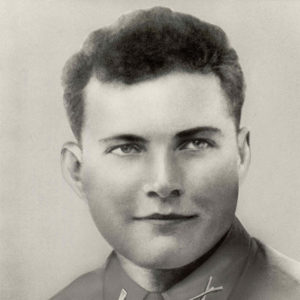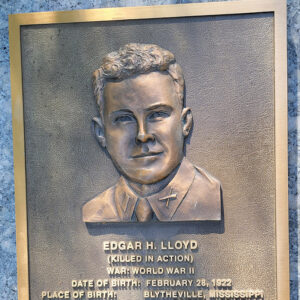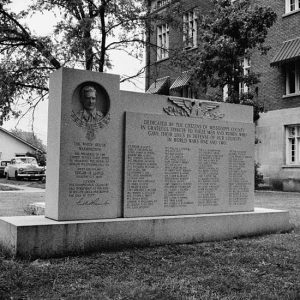calsfoundation@cals.org
Edgar Harold Lloyd (1922–1944)
Edgar Harold Lloyd was awarded the Medal of Honor for service above and beyond the call of duty during World War II. The Medal of Honor is the highest award presented to an individual serving in the United States armed services for valor against an enemy force.
Harold Lloyd was born on February 28, 1922, in Yarbro (Mississippi County) to Edgar Bentley Lloyd and Lillian Lindley Lloyd, who were farmers. He had one sibling, a sister named Marvin Emma. Lloyd graduated from Blytheville High School in 1939 and then attended the University of Arkansas (UA) in Fayetteville (Washington County). There, he was president of the Associated Students and active in fraternity and other campus activities. He was captain of Company F of the Reserve Officers’ Training Corps (ROTC) infantry unit. Inducted into the U.S. Army in April 1943, he was allowed to complete college, graduating with a BSA in agronomy on June 7, 1943.
Lloyd then attended Officer Candidate School at Fort Benning, Georgia, and was commissioned as a second lieutenant on November 9, 1943. After various postings for training, on July 1, 1944, he went overseas as part of General George C. Patton’s Third Army. He was a rifle platoon leader of Company E, 319th Infantry, Eightieth Division.
By September 1944, the 319th Infantry was participating in the Lorraine operation to repel German troops near the Moselle River in France. On September 14, his company was assigned to expel 200 enemy troops from a heavily fortified position near the small town of Pompey, approximately twelve kilometers north of the city of Nancy. He received the Congressional Medal of Honor for his actions on that date and was subsequently promoted to first lieutenant. His Medal of Honor citation notes that Lloyd “leaped to his feet and led his men on a run into the raking fire of the enemy’s position, shouting encouragement to them. He jumped into the first enemy machine gun position, knocked out the gunner with his fist, dropped a grenade, and jumped out before it exploded.” During that action, he “personally destroyed 5 machine guns and many of the enemy and by his daring leadership and conspicuous bravery inspired his men to overrun the enemy positions and accomplish the objective in the face of seemingly insurmountable odds.”
Lloyd was scheduled to receive his Medal of Honor from President Franklin D. Roosevelt, but he was killed in action by enemy sniper fire on November 16, 1944, near Limey, France. He is buried on the Mississippi County Courthouse lawn in Blytheville, adjacent to a monument honoring all of the Mississippi County service men killed in both world wars. His family gave his Medal of Honor to the county judge, and it is kept in the judge’s office in the courthouse.
After the war, UA honored its war heroes by naming several temporary housing facilities for some of them. Lloyd Halls, a group of six barrack-style buildings, served as dormitories until 1955 and were later demolished. Lloyd Way, a street in Fort Benning, Georgia, is also named for him, as is an athletic field in Europe.
For additional information:
“Edgar Harold Lloyd.” In Mississippi County, Arkansas: Appreciating the Past; Anticipating the Future, edited by Deanna Snowden. Little Rock: August House, 1986.
“Edgar Harold Lloyd, C.M.H.” Special Collections. University of Arkansas Libraries, Fayetteville, Arkansas.
“General Praises Missco Soldiers Who Fell in Battle; Memorial to Lieutenant Lloyd and Others Formally Dedicated.” Blytheville Courier News. November 6, 1949, pp. 1, 5, 12.
“Yarbro Officer Listed as Dead; Lieut. Harold Lloyd Previously Reported Missing in Action.” Blytheville Courier News. December 8, 1944, p. 1.
“Yarbro Officer Lost in France.” Blytheville Courier News. December 4, 1944, p. 1.
Ruth C. Hale
Burdette, Arkansas
 Military
Military Edgar H. Lloyd
Edgar H. Lloyd  Edgar H. Lloyd Plaque
Edgar H. Lloyd Plaque  Edgar Harold Lloyd Monument
Edgar Harold Lloyd Monument 




Comments
No comments on this entry yet.